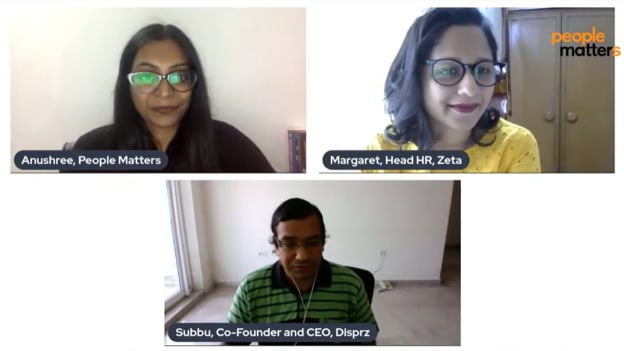Building a skilling ecosystem in digital-first companies

The pandemic accelerated digital disruption and the gap between digital talent and demand widened. As the shelf-life of emerging skills such as AI, blockchain, cloud, data analytics etc. reduced, new roles and new skills came to the forefront. Organizations are looking to build or buy talent not just for functional-domain expertise, but for people skills. Here’s how.
To check out the webcast, follow the link below.
The New Age Skills Landscape
As Margaret Dsouza, Head HR, Zeta, shares, 'We hire people who can stand the test of time through high-risk-high-pivots, and this demands skills such as adaptability to change, flexibility, problem solving, communication, collaboration, and interpersonal skills.' Power skills is the new buzzword, as Subbu shares the Disprz Atomic Skills Model, and the skills pyramids constituting Functional – Digital – Leadership – Meta Skills from top to base.
- Meta skills form the foundation i.e. the ability to learn other skills such as learning agility, data intelligence, emotional intelligence, etc.
- Leadership skills revolve around Leading Self, Leading Teams, and Leading Organizations i.e. time management, self awareness, conflict management, feedback etc.
- Functional Foundation Skills are centred around marketing, engineering, etc.
- Contextual Functional Skills are high velocity skills. From the bottom to top, the skills fungibility reduces, making it important to apply the context while upskilling, cross skilling and reskilling.
Challenges and solutions for right skilling
As new roles are get created and existing ones disrupted, emerging skills are in shortage. Zeta follows a balancing path for build-versus-buy. “To hire the best talent, we hire across markets and hire for potential, collaborative and entrepreneurial mindset and then groom, rather than hiring experts”, shares Margaret. Making people stick, while internally mobilizing them and enabling them to upgrade to market-relevant skills is a priority at Zeta. Subbu recommends to start with understanding the existing talent, aligning their career aspirations with the new normal, and getting them to reskill and cross-skill basis their learning agility. Lack of time is another challenge. Overcoming the challenges demands unlearning conventional learning modes, and truly understanding how people wish to learn and grow in the organization.
Innovative Learning Approaches to Build a Learning Culture
The learning-first organization pillars @ Zeta are:
Democratize learning: Individuals are provided the resources, ability and autonomy to make learning decisions. Tools and platforms must create the right learning experiences by curating learning journeys, encouraging peer-to-peer knowledge sharing, and enabling managers by getting them to decode learning-data. This will create a learning pull.
Make the right investments to bring learning to people: Organizations must understand what makes people consume learning. Custom-tailoring learning platforms to leverage the right tools, experts, and influencers, is the way to make learning a ritual.
Augment career growth with learning: L&D must unlearn one-dimensional learning paths and curate person-based growth paths. 'We need to start thinking matrix careers, providing avenues and options for people to try out new things,' shares Margaret.
To incorporate these elements in the learning strategy, organizations must program a step-by-step approach which involves understanding and creating career paths using a role matrix and roles dictionary, skill-mapping for each roles, assessing people for both current and potential roles, and then instating skill development programs. Employees must be given visibility and content availability to make a long term learning culture. Some tools to foster this are
- Online medium such as masterclasses, webinars, white papers, social forums at Zeta
- 1-0-1 assessments and 360 degree assessments
- ‘Learning Day’ @ Disprz allows for bandwidth for learning.
- Tech Conclave @ Zeta helps people learn under the hat of reflect-retrospect-celebrate
- Data-hacks by Disprz help bring people out of their routine work and brainstrorm and co-create creative solutions.
- ‘A day in the life of an employee’ to help people practically understand career paths
- Squads which offer a view of vertical and horizontal working, enabling myriad learnings.
- All-hands engineering days get the right people together in a social setting to foster flow and exchange of information.
'The approach to build a learning organization strategy is to adopt digital learning initiatives, start with a clear understanding of roles and skills, think about the future and take it ahead,' says Subbu. Most important element to ensure learning success is to marry the people end with the business end. Internally mobilizing individuals and developing their skills, measuring its impact on productivity and business outcomes as per the stage and maturity of the organization, is the way ahead. This requires top leadership to build a learning mindset. 'Stay focused on what you really want to do, prioritize and iterate. Crowdsource the best minds, and curate the best programs,' says Margaret.





